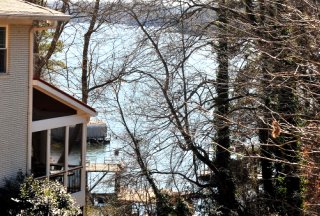|
Article Courtesy of The
Gainesville Times
By The Editorial Board
Published March 16, 2018
|
In
the past, homeowners weren’t told what color to paint a house, whether they
could put a flag or a swingset in the front yard or how to decorate at the
holidays. Many today willingly accept such rules as the price of living in
upscale neighborhoods governed by homeowners associations.
Now another set of property rights rules is being considered, only in this case
by government, and not by choice.
|
Hall County commissioners are weighing
new limits on vacation rentals aimed at houses on Lake
Lanier often used for visitors, many of them booked on
internet sites. A quick search for “Hall County, Georgia”
shows 191 rentals on Airbnb and 50 listed with VRBO.
The county is responding to complaints from some permanent
lakeside residents over loud, late-night parties, cars
parked on the street and in yards, and trash left behind.
But noise ordinances, parking limits, public intoxication
and littering laws should cover those problems. Barring
homeowners from the chance to earn rental income over
specific conduct by some customers would impose excessive
limits on a free market and individual rights.
Still, commissioners are in a tight spot: On the one hand,
they have to respond to concerns by homeowners whose
tranquil lakeshore lives are being interrupted. On the
other, they still need to respect private property laws by
crafting sensible rules that don’t discourage all rentals.
|
|
Hall County is searching for a way to better regulate
vacation rental properties.
|
“We’re trying to find a balance,” Board of Commissioners Chairman Richard
Higgins said.
The latest set of rules being considered would be somewhat less restrictive
than earlier attempts but with stronger enforcement than the licensing rules
in place now. Despite the number of rentals available, only eight homes in
Hall now have proper vacation rental licenses.
The new rules would include limiting the number of vehicles parked on a property
to seven, with variances allowed for larger homes; requiring a smoke detector in
each bedroom, adjoining hallway and common area, already standard for any new
construction, according to the Gainesville fire marshal; requiring onsite
inspections and building code compliance for rentals with approved occupancy of
16 or more; and once a license is secured, the owner would pay for the county to
send letters to all neighbors within 500 feet alerting them to the rental status
of the home.
The new rules also would have the county Marshal’s Office check the online sites
to see if there are homes being rented without a license, and levying fines up
to $1,000 for repeat offenders in a single year. The public is invited to weigh
in before a final vote March 22.
It’s easy to sympathize with residents who can’t get a good night’s sleep
because of wild parties and concerns over who may be occupying the house next
door at any given time. But the problem is with the behavior, and the county can
and should address that through existing laws. Those who disturb the peace at
all hours, trash yards or clog roads with vehicles should face consequences.
Not all renters are out to throw an “Animal House” toga party by the lake. Those
who visit and remain quiet and peaceful shouldn’t be lumped in with the bad
actors. Address the lawbreakers without punishing everyone.
Skeptics may also feel local governments are looking to enforce licensing fees
merely as a way to raise more revenue, or perhaps to mollify complaints from
hotel owners who have to comply with their own set of regulations. It’s somewhat
like the tug-of-war waged in many cities over ride-sharing businesses like Uber
and Lyft competing with highly regulated taxicab companies.
That leaves us to ask: Are these burdensome regulations created to safeguard the
consumers, or are they being used to support legacy businesses over internet
startups? If it’s the latter, perhaps the question is not whether new-age
industries should have to face the same restrictions but whether government
should impose such a tangle of red tape on any of them.
Commissioners must walk a fine line to allow homeowners the right to make their
own private-market deals, provided it complies with a reasonable set of rules
and doesn’t interfere with the rights of neighbors. Whatever rules they draft
should be enforced evenly while seeking to address the real concern — rentals
that disrupt the peace of others.
Thus, if a homeowner applies for a rental license and that home becomes a
regular scene of noise or occupancy complaints, that license could be revoked or
suspended. Those who rent out their homes with no such problems shouldn’t have
to jump through extra hoops.
It serves no great purpose to block fresh methods visitors use to enjoy Lake
Lanier and spend money at local restaurants, shops and other businesses. The
county should welcome these guests by applying the licensing rules in place
without making them any more restrictive and enforcing existing laws to ensure
residents are not disturbed or inconvenienced.
That would be a win-win for everyone who lives by the lake. |
